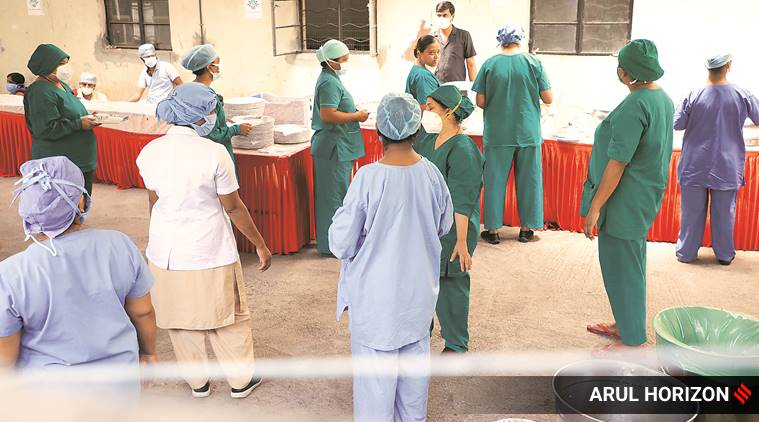 Amid the COVID-19 pandemic, these workers have been acting as foot soldiers of the BMC, going door to door and contact-tracing, having traced over a lakh high and low risk contacts so far. (Representational)
Amid the COVID-19 pandemic, these workers have been acting as foot soldiers of the BMC, going door to door and contact-tracing, having traced over a lakh high and low risk contacts so far. (Representational)
Community Health Volunteers (CHVs), who form the backbone of the Brihanmumbai Municipal Corporation’s (BMC) health workers, have become the most vulnerable of the civic body’s frontline staff in the coronavirus fight. Over the last few days, six CHVs have tested positive in Mumbai, raising concerns among the workers.
There are about 4,000 community health volunteers in Mumbai, who work on the ground and help implement health schemes of the civic body as well as the state and central governments.
They also aid awareness campaigns at the grassroots level. These workers receive a remuneration of Rs 5,000. Amid the COVID-19 pandemic, these workers have been acting as foot soldiers of the BMC, going door to door and contact-tracing, having traced over a lakh high and low risk contacts so far.
However, lack of adequate safeguards and safety equipment have made these volunteers vulnerable to the infection.
About a fortnight ago, when a woman volunteer tested positive in Bandra east, CHVs at Bharat Nagar in Bandra east and Santacruz health posts threatened to stop work unless given proper safety gear like masks, gloves, hand sanitizers and PPEs. They resumed work after civic officials warned of termination under the epidemic Act.
“We are called ‘corona warriors’ by people. But what kind of warriors are we? Fighting without proper safety gear only puts ours’ and the lives of our families at risk,” said Anuja Bhale, a community health volunteer in Bharat Nagar.
Bhale joined BMC as a volunteer in 2012. There are about 200 health posts across the city, from where these grassroots workers operate.
Their duty hours are 9 am to 2 pm but most work till 5 pm. And hardly get week offs amid the outbreak.
“Cases have increased in the city and we are scared to enter areas for contact tracing. Most of the times, we buy masks, gloves and hand sanitisers on our own. If masks and gloves are provided, we are told to reuse at least five to six days by washing them,” said Bhale.
Speaking to The Indian Express, Deputy Executive Health Officer, Dr Daksha Shah said, “We will look into the matter and also ensure that all CHVs get safety equipment. On insurance, I will check with the HR department. Also, the hiked honourirum proposal has been cleared. I will check the status.”
Rupam Arkekar, a community health volunteer from Santacruz health post, said when her friend tested positive, she faced major discrimination from her family as well as neighbours. “Her family blamed her for putting them at risk. They were angry as they were placed in quarantine. Neighbours were also hostile,” said Arkekar.
Most of the CHVs live in chawls. “My neighbours have complained against me to the police saying that I am going out and spreading the infection. I have to explain that I am a CHV,” she said.
The work these volunteers do deserves better pay, the union representing them said. Also, there is no clarity on whether these workers will be covered by health insurance, it said.“As the CHVs are involved in surveying and awareness campaigns of government-run health schemes they know each and every household very well,” said Prakash Devdas, president of Mahapalika Arogya Seva Karmchari Sangathana.